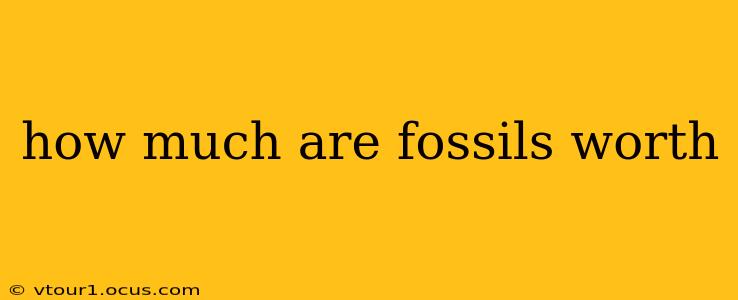The value of a fossil is incredibly variable, depending on a multitude of factors. It's not simply a case of digging something up and instantly knowing its worth. Unlike precious metals or gemstones with established pricing structures, fossil valuation is a more nuanced process. This guide will delve into the key factors that influence a fossil's price, helping you understand what makes some fossils worth thousands, while others remain relatively inexpensive.
What Factors Determine a Fossil's Value?
Several factors contribute to a fossil's monetary worth. These include:
-
Rarity: The scarcer the fossil, the higher its potential value. A well-preserved specimen of a rarely found species will command a much higher price than a common trilobite. The rarity is often determined by the geological location, the species itself, and the quality of preservation.
-
Completeness and Preservation: A complete and well-preserved fossil is significantly more valuable than a fragmented or poorly preserved one. The level of detail visible and the overall condition greatly impact the price. A perfectly articulated skeleton will always be more desirable than a pile of scattered bones.
-
Scientific Significance: Fossils that offer significant scientific insights—for example, representing a transitional species, a previously unknown organism, or shedding light on evolutionary processes—can be incredibly valuable, even exceeding the value of visually stunning specimens. Museums and research institutions are major buyers of scientifically important fossils.
-
Species and Age: The age and species of the fossil heavily influence its value. Fossils of iconic dinosaurs, prehistoric mammals, or other extinct creatures with widespread recognition tend to fetch higher prices. Older fossils, particularly from significant geological periods, are often more valuable.
-
Preparation and Presentation: The professional preparation of a fossil dramatically affects its value. Skilled preparation can enhance the fossil's visual appeal and reveal intricate details otherwise hidden in the matrix. A beautifully prepared and displayed fossil will command a higher price than a poorly prepared one.
-
Provenance and History: Knowing the fossil's origin and history adds value. A fossil with a documented history, a known collection history, or ties to renowned paleontologists will often be more desirable. This adds to its authenticity and narrative appeal.
-
Market Demand: Like any collectible item, market demand influences the price of fossils. Popular and well-known species will naturally have a higher demand, driving up their prices. Trends and media coverage can also significantly affect demand.
How Much Can Fossils Actually Sell For?
The price range is enormous. A common, small fossil might only cost a few dollars, while exceptional specimens can sell for hundreds of thousands, or even millions, of dollars. High-profile auction sales often showcase the extremes of this spectrum.
-
Low-value fossils: Common invertebrate fossils, small fragments, or poorly preserved specimens may only sell for a few dollars to a few hundred dollars.
-
Mid-range fossils: Well-preserved specimens of more recognizable species, particularly from popular geological formations, can sell for hundreds or even thousands of dollars.
-
High-value fossils: Rare, complete, and scientifically significant fossils, such as complete dinosaur skeletons, can reach millions of dollars at auction.
Are there any resources to help determine the value of a fossil?
Unfortunately, there isn't a single, definitive guide to fossil valuation. It's a complex process often requiring the expertise of paleontologists, appraisers specializing in natural history objects, and fossil dealers. Consulting with these professionals is the best way to get a realistic estimate of a fossil's worth. You can also research similar fossils sold at auction to get a general idea of the market value.
How can I sell a fossil?
Selling fossils requires careful consideration. Ensure you have legal ownership, understand any regulations regarding the sale of fossils in your region, and choose a reputable buyer to avoid scams. Auction houses specializing in natural history artifacts or reputable fossil dealers are often good options.
What are some common mistakes people make when valuing fossils?
Overestimating the value based on personal attachment or limited research is a common error. Don't rely on online estimates or quick valuations without consulting with experts in the field. Also, be wary of inflated values presented by sellers, always seek independent verification.
In conclusion, the value of a fossil is a multifaceted assessment, encompassing scientific significance, rarity, preservation, and market demand. Always seek professional appraisal for accurate valuation. Remember to handle fossils responsibly and ethically, ensuring their preservation for future generations.
